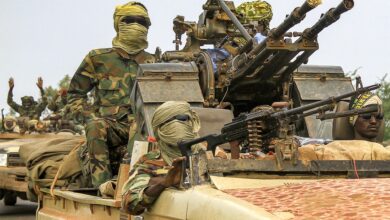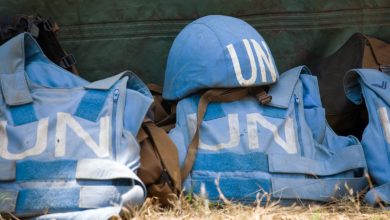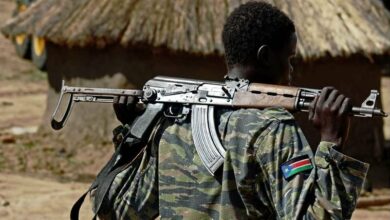A United Nations peacekeeper was killed and eight others wounded in clashes with armed groups in a restive neighbourhood in Bangui, the capital of the Central African Republic, a security source told AFP.
Peacekeepers from the U.N.’s Minusca force along with Central African troops have since Sunday been carrying out a “disarmament and arrest” operation against armed groups in Bangui’s mainly Muslim PK5 neighbourhood.
At least 46 people have been injured in fierce armed clashes in the enclave, according to aid group Medecins Sans Frontieres which has treated the majority of casualties.
The security source told AFP the peacekeeper was killed when a Minusca patrol was ambushed by rebel gunmen on the outskirts of the PK5 neighbourhood on Tuesday afternoon.
“A Rwandan patrol supported by Central African forces was shot at and then pursued the attackers into PK5,” the source told AFP.
One PK5 resident contacted by AFP said that civilians had been killed in the ongoing violence, though that was not possible to independently confirm.
Operation against armed groups in Bangui’s PK5
On April 1, U.N. peacekeepers exchanged fire with members of an armed group in PK5, the first attack on U.N. troops since violence resumed in the neighbourhood in 2017.
On Sunday, gunfire was exchanged after U.N. troops were targeted near the president’s residence in Bangui, just hours after U.N. and Central African forces launched the joint operation targeting armed groups in PK5.
At least two people were killed and dozens wounded during the “disarmament and arrest” operation on Sunday, according to U.N. and medical sources. Minusca spokesperson Herve Verhoosel said 11 peacekeepers, mostly Egyptian, were among the injured.
The joint force raided the bases of several groups, resulting in the seizure of arms, ammunition, and drugs, Minusca said. Eight people belonging to the armed groups Force and 50/50 were detained, Verhoosel told AFP.
PK5’s population was previously supportive of the armed groups, which came from a desire to protect their neighbourhoods in the country’s civil war, recently they have been accused of intimidation and of extorting protection money, and Minusca considers them criminal.
Minusca said it would dismantle all the armed groups’ bases unless they hand over their weapons, but the groups’ leaders refused, despite a mediation organized by community leaders.
“This joint operation will continue until the criminal groups of PK5 are dismantled or otherwise disappear,” Minusca said.
Although rich in diamonds, gold, oil and uranium, the former French colony has one of the world’s poorest populations, and has been blighted by violence and instability since gaining independence in 1960.
In March 2013, Séléka, a mainly Muslim alliance, overthrew CAR’s leader Francois Bozizé, which led to a spiral of violence between Muslim and Christian militias in which thousands died.
Many joined the mainly-Christian anti-balaka militia to fight the Seleka rebels. Muslims either fled the capital or took refuge in PK5, where the population funded the creation of their own self-defence groups, most of whom were former Seleka rebels, to defend from anti-balaka vigilante attack.
The weak government only controls around a fifth of the Central African Republic. The rest of the territory is controlled by militia groups. President Faustin-Archange Touadera, a former prime minister who campaigned as a peacemaker, was declared the winner of a 2016 election perceived as crucial to transitioning from years of sectarian violence.
Launched in 2014, Minusca is considered one of the U.N.’s most dangerous peacekeeping missions.
On April 2, one U.N. peacekeeper from Mauritania was killed and 11 others were wounded and more than 22 anti-balaka fighters were killed when a temporary U.N. base in Tagbara came under heavy militia attack.
Minusca said it later discovered the bodies of 21 civilians, including four women and four children, near a church, and that the deaths resulted from a separate incident that used “traditional weapons,” indicating machetes or knives.
Gun battle near Central African Republic president’s residence after joint UN operation in Bangui
With reporting from AFP












